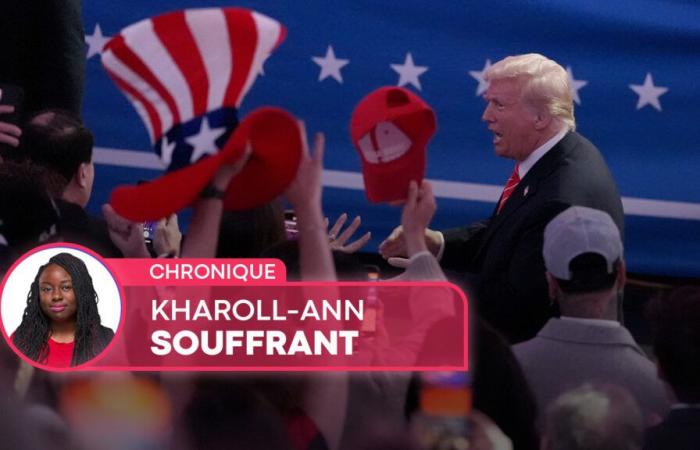In his farewell address to the nation, outgoing Democratic Party President Joe Biden spoke about the threat of oligarchs. A term referring to Trump and the wealthy tech industry giants, who pose a danger to democracy.
To tell the truth, this boys club is already dictating the parameters of the vote for the next Canadian federal election. As if we were being held hostage by Trump and the web giants, an explosive cocktail that does not bode well.
The threat of “broligarchs”
Many could argue that we have always lived in an oligarchy, that is, the fact that a small elite made up of a handful of individuals is the one who calls the shots in the United States. It would be more accurate to speak of “broligarchy” established by the worthy representatives of GAFAM, i.e. the Mark Zuckerbergs, Elon Musk and Jeff Bezos of this world, the latter were all very close to President Trump.
At the beginning of January, Ann Telnaes, an award-winning cartoonist who previously worked for the Washington Post since 2008, published an open letter in which she explained her resignation from the daily, sounding the alarm about the quiet death of press freedom in the United States. The Washington Post reportedly refused to publish one of his cartoons criticizing Trump and the procession of billionaires at his feet. She attributes this censorship and this dangerous precedent to the proximity of Jeff Bezos – current owner of the Washington Post – to Trump. In the process, nearly 400 daily employees requested an emergency meeting with Bezos just a few days ago in the face of the increasingly uncertain future of the Washington Post.
During the last American election campaign which pitted Trump against Democrat Kamala Harris, The Washington Post decided that it would no longer publish the newspaper’s editorial endorsement of a candidate, a first in 30 years. An announcement which plunged the daily newspaper into turmoil and which led to a wave of resignations and cancellations of subscriptions at the end of last year.
Canada, the media and C-18
In Canada, since the adoption process of Bill C-18, news has been blocked on Meta, parent company of Facebook and Instagram, whose owner is Mark Zuckerberg. It is too easy to blame social media and hold it solely responsible for the collapse of our media ecosystem. The industry needs to demonstrate some humility and deep introspection about what it offers to the public. The situation offers a window of opportunity in this regard.
However, it is not insignificant to note the real dead end that this blockage constitutes. Many of us – journalists and columnists – feel obliged to occupy these platforms, because that is mainly where the population gets their information. Boycotting and completely disappearing from social networks would accelerate the industry’s agony. The least we can say is that the GAFAM business model is one that works to their advantage, placing the media industry in a real catch-22 : damn if you do, damn if you don’t.
-How to deal with Trump?
Since the resounding resignation of Deputy Prime Minister Chrystia Freeland; resignation having been the final blow that nailed Justin Trudeau’s political coffin, speculation is rife as to who will become the next leader of Canada’s Liberal Party. With the federal elections imminent, Pierre Pollièvre’s conservative party is currently ahead in voting intentions.
Several have already jumped into the fray to succeed her, including Ms. Freeland herself. The latter has already had to manage Mr. Trump, as Minister of Foreign Affairs, during the Republican’s first term from 2016 to 2021, something that she is putting forward in her campaign as a formidable asset.
The specter of an increase in Trump’s customs tariffs is creating a commotion here: the prime ministers of the different provinces and a number of elected politicians are seeking to have a unified speech to determine the best strategy for respond to them and thus limit the damage to Canadians.
Americanocentrism, power 1000
Through his escapades and shocking statements, Donald Trump dictates the media agenda of the day, even in Canada. A situation that benefits the media for better and for worse. It is well known that polarization and scandal sell. This phenomenon, however, is not new. For example, for a long time now, Quebec has covered American politics more than the realities of French-speakers outside Quebec in other Canadian provinces. However, this Americanocentrism and this feeling that our entire lives depend on what happens in our neighbors to the South have been accentuated in recent years, in particular because of the close economic ties between Canada and the United States.
There is only one certainty at this point. It is becoming increasingly clear that the question at the ballot box in Canada will be who will be in a position to “manage” the temperament of the 47th President of the United States, whose second term promises to be even more unpredictable than his first. .






